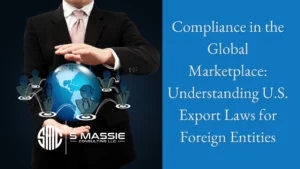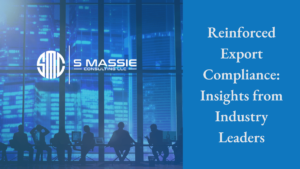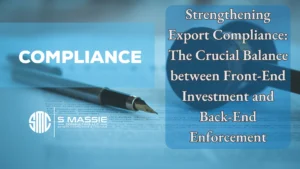Prioritizing Export Compliance to Avoid Enforcement Nightmares
Export compliance is critical to international trade, but it’s easy to make mistakes without proper preparation. It involves adhering to various regulations and laws governing the export of goods and technology, ensuring that exports don’t threaten national security or foreign policy objectives. Non-compliance can lead to severe penalties and legal consequences, including fines, business operation restrictions, and criminal charges.

1. Introduction: The Significance of Export Compliance
Export compliance refers to adhering to the laws, regulations, and procedures governing the export of goods, technologies, and services. It ensures that companies operate within legal boundaries while engaging in international trade. Compliance helps mitigate the risk of unauthorized exports, the diversion of sensitive technologies, and compliance violations.
2. Understanding Export Controls
2.1 Types of Export Controls
Export controls encompass various measures designed to protect national security, prevent terrorism, and ensure foreign policy objectives. These controls can include restrictions on specific goods, technologies, destinations, end-users, and end-uses. The primary types of export controls include:
- Dual-Use Items: Goods, technologies, or software that have both civilian and military applications.
- Military Items: Equipment, technologies, and software designed or modified specifically for military use.
- Sanctioned Countries: Countries subject to economic embargoes or trade restrictions due to political or security reasons.
- End-User and End-Use Controls: Restrictions imposed on specific individuals, organizations, or purposes for export.
- Licensing Requirements: Legal obligations to obtain licenses or permits for certain exports.
2.2 Regulatory Authorities
Export controls are enforced by regulatory authorities, which may vary depending on the country. In the United States, for example, the primary regulatory bodies include the Bureau of Industry and Security (BIS), the Directorate of Defense Trade Controls (DDTC), and the Office of Foreign Assets Control (OFAC).
3. Common Challenges in Export Compliance
3.1 Complex Regulatory Environment
Export compliance can be complex due to the multitude of regulations and requirements imposed by different countries. Staying up to date with changes in export control laws and understanding their implications can be a daunting task.
3.2 Classification and Licensing
Accurate classification and licensing of products are critical to ensure compliance. Determining the correct Export Control Classification Number (ECCN) or Harmonized System (HS) code is essential to identify licensing requirements and restrictions.
3.3 Screening and Denied Party Lists
Screening potential customers, suppliers, and partners against denied party lists is crucial to prevent engaging with prohibited individuals or entities. These lists include individuals, organizations, and countries subject to sanctions or restrictions.
3.4 Supply Chain Management
Managing export compliance throughout the supply chain is a complex challenge. Ensuring that all parties involved in the export process comply with regulations and adequately screen transactions and shipments is vital.
4. Developing an Effective Export Compliance Program
4.1 Assessing Risks and Vulnerabilities
Conducting a comprehensive risk assessment helps identify potential compliance gaps and vulnerabilities. It involves evaluating export activities, partners, and the regulatory landscape to prioritize efforts and allocate resources effectively.
4.2 Establishing Policies and Procedures
Developing clear and concise policies and procedures is essential to provide guidelines for employees and ensure consistent compliance across the organization. These should cover areas such as product classification, licensing, screening, record-keeping, and reporting.
4.3 Training and Education
Properly training employees on export compliance is crucial to create awareness and understanding of their roles and responsibilities. Regular training sessions and educational resources should be provided to ensure ongoing compliance knowledge.
4.4 Auditing and Monitoring
Regular audits and ongoing monitoring are vital to identify and address compliance issues promptly. Audits should include internal controls, documentation, and processes to verify compliance with export regulations.
5. Leveraging Technology for Export Compliance
5.1 Export Management Software
Export management software streamlines and automates export-related processes, enhancing compliance and efficiency. It helps manage licenses, classifications, documentation, and record-keeping, reducing the risk of errors and non-compliance.
5.2 Automated Screening Solutions
Automated screening solutions enable real-time checks against denied party lists and sanctions databases. These tools enhance due diligence efforts and provide alerts when engaging with high-risk individuals or entities.
5.3 Data Analytics and Reporting
Leveraging data analytics and reporting capabilities allows organizations to gain insights into export compliance performance. It facilitates the identification of trends, areas of improvement, and potential risks, enabling proactive compliance management.
6. The Benefits of Prioritizing Export Compliance
Prioritizing export compliance offers several advantages for businesses, including:
- Mitigating legal risks and penalties associated with non-compliance.
- Safeguarding national security and protecting sensitive technologies.
- Enhancing reputation and credibility in the global marketplace.
- Streamlining operations and reducing the risk of disruptions.
- Gaining a competitive edge by demonstrating commitment to compliance.
7. Conclusion
Export compliance is a critical aspect of international trade that should not be overlooked. By prioritizing compliance efforts, businesses can protect themselves from enforcement nightmares and position themselves for success in the global market. Remember, compliance is an ongoing process that requires continuous evaluation, education, and adaptation to ever-changing regulations.
FAQs
Export compliance violations can lead to severe penalties, including fines, imprisonment, loss of export privileges, and damage to a company’s reputation.
Yes, all companies involved in international trade must comply with export regulations, regardless of their size or industry.
Technology solutions such as export management software and automated screening tools can streamline processes, enhance accuracy, and improve compliance management.
Denied party lists are databases that contain individuals, organizations, and countries subject to sanctions or trade restrictions due to various reasons, including national security concerns.
Regulatory authorities, such as the Bureau of Industry and Security (BIS), provide guidelines, training materials, and updates on export regulations.
Sarah Massie, President of S Massie Consulting LLC, has witnessed many companies underestimate the importance of export compliance over the years, leading to costly mistakes. This is particularly true for companies with EAR99 products that may overlook regulations they believe don’t apply to them or those in the supply chain of ITAR products who misunderstand their role in ITAR compliance. It is critical for businesses to understand the regulations and implement a robust compliance program to avoid potential penalties and legal consequences.
With recent announcements from a panel of government officials responsible for enforcing sanctions and export controls, including Matthew Axelrod, Assistant Secretary for Export Enforcement, Bureau of Industry and Security, US Department of Commerce; Matthew Olsen, Assistant Attorney General, National Security Division, US Department of Justice; Andrea Gacki, Director, Office of Foreign Assets Control, US Department of Treasury; and Steve Francis, Acting Executive Associate Director for Homeland Security Investigations, US Department of Homeland Security, it’s crucial for businesses to prioritize export compliance, especially ITAR compliance. The speakers emphasized that sanctions and export control enforcement against corporations is here to stay, and businesses should expect continued scrutiny and enforcement efforts.
S Massie Consulting LLC specializes in helping businesses comply with export regulations. The company provides tailored written export compliance programs that include policies and procedures to ensure that exports are compliant with applicable laws and regulations. Additionally, the company offers employee training programs designed to educate employees on the regulations and laws governing exports, making sure they understand their responsibilities and the consequences of non-compliance.
With the recent announcement of increased enforcement efforts, businesses must prioritize export compliance to avoid penalties and legal consequences. S Massie Consulting LLC provides businesses with the necessary tools and expertise to ensure their compliance with regulations and laws. Their written compliance programs and employee training programs help businesses avoid enforcement issues and protect their operations. By working with S Massie Consulting LLC, businesses can focus on their core operations, knowing that their export compliance is in good hands.


